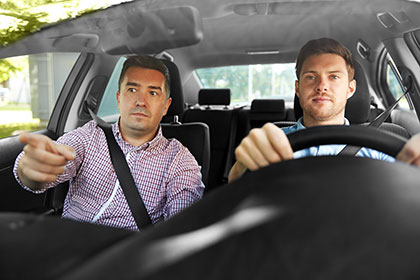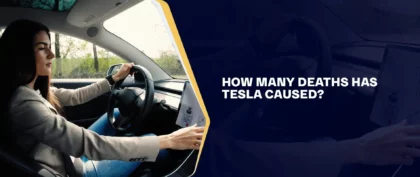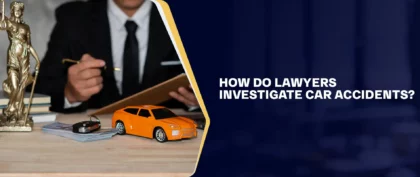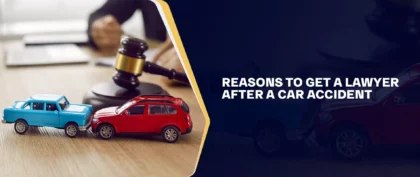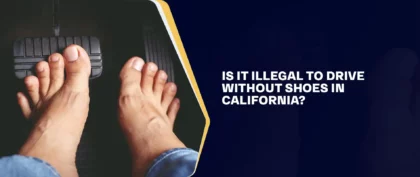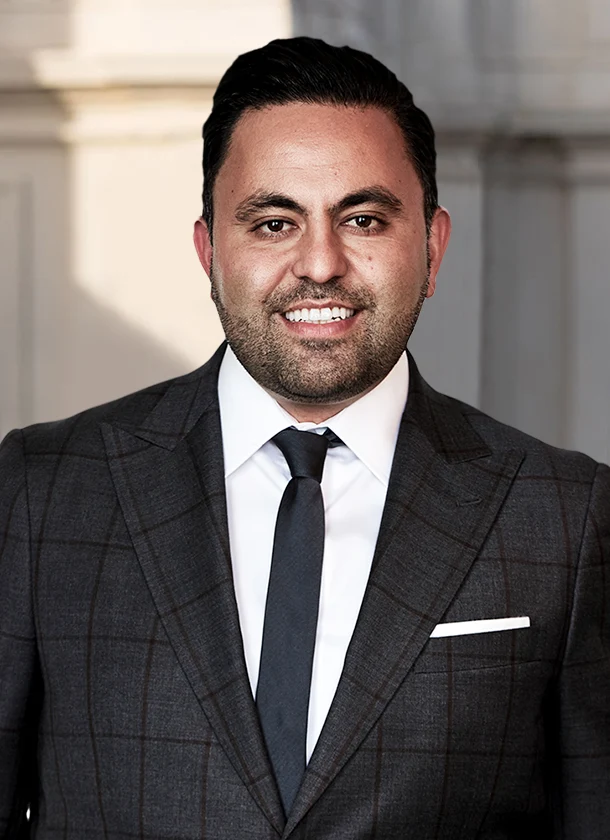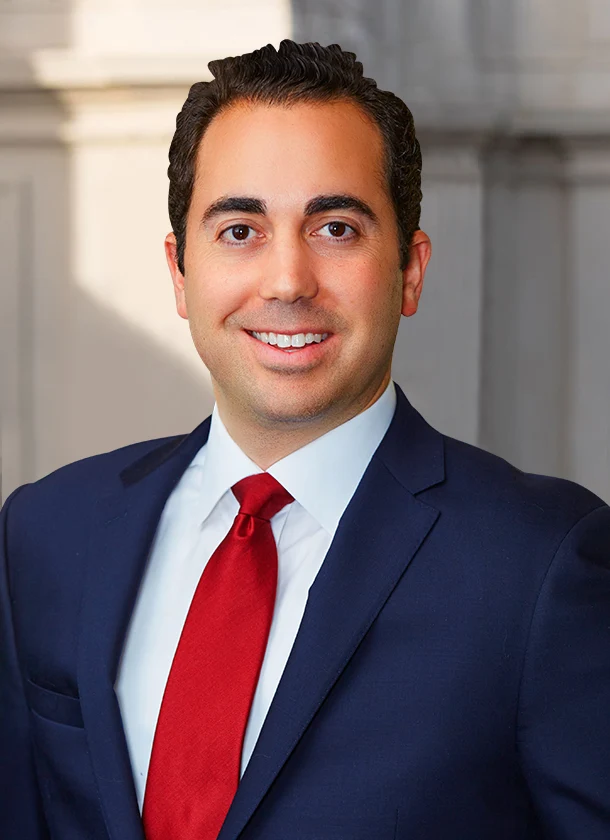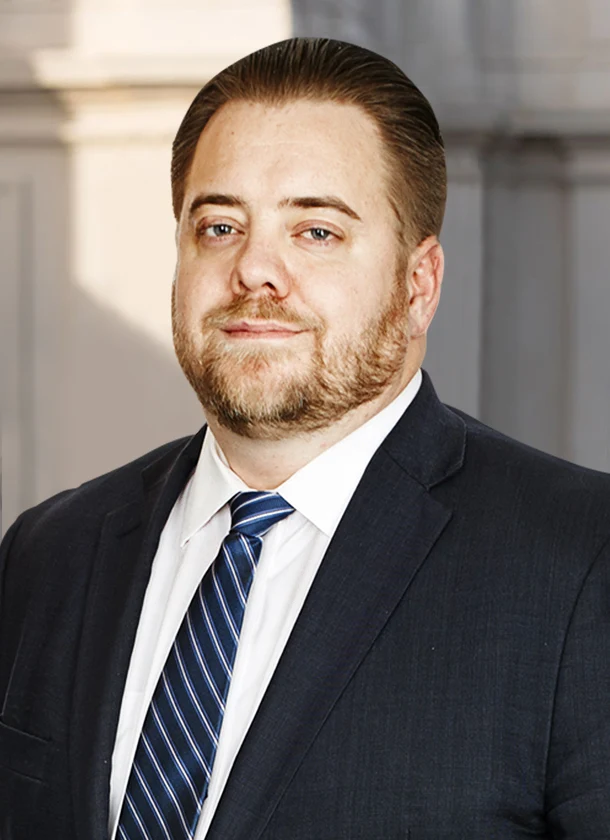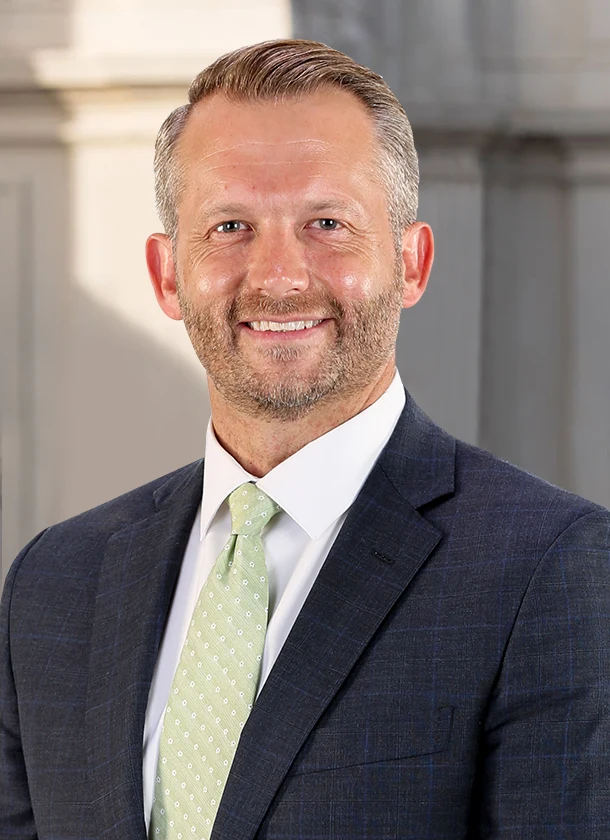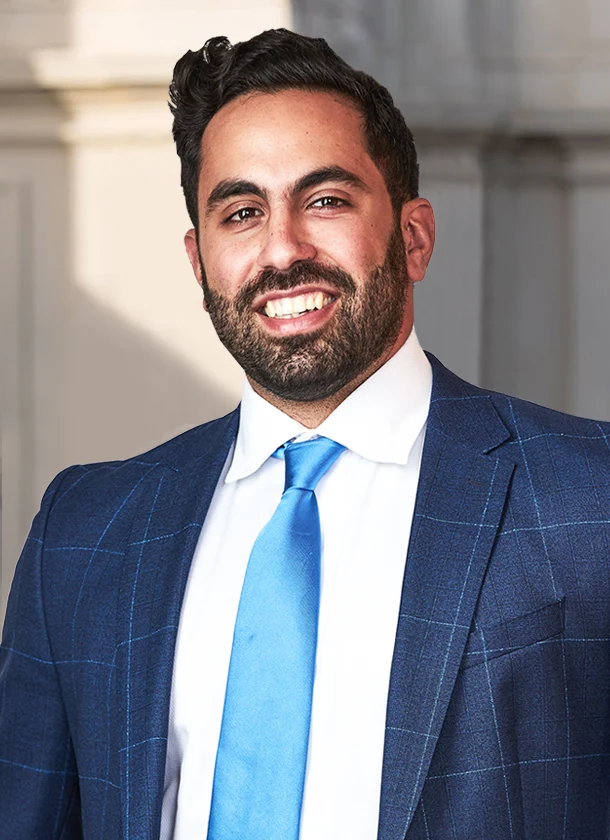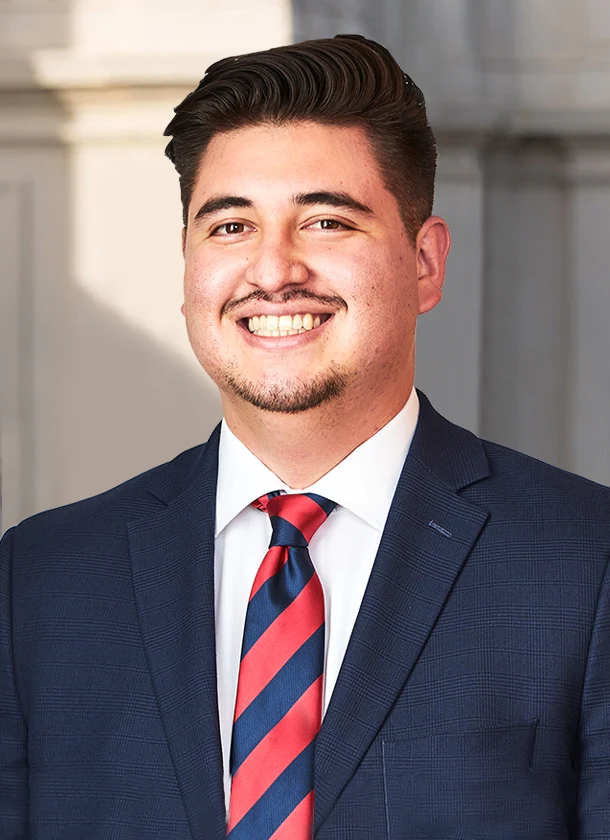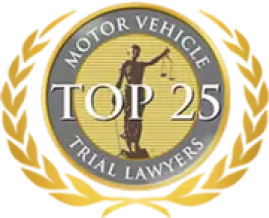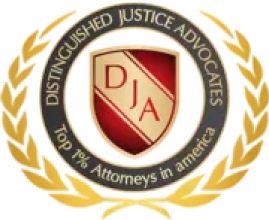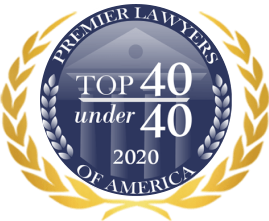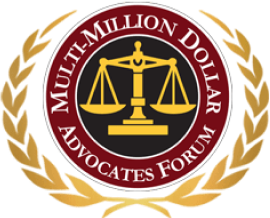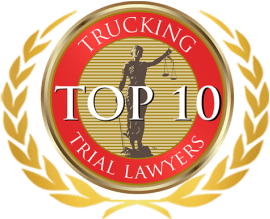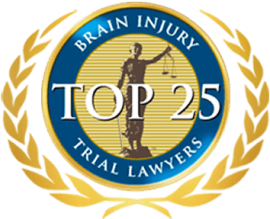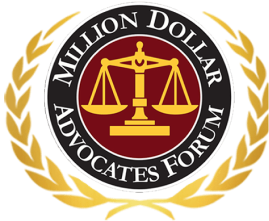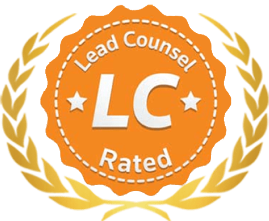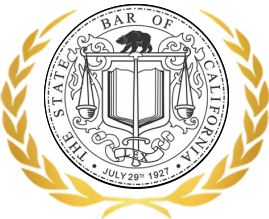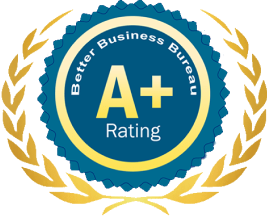All car accidents have the potential to result in significant legal action to recover damages, and most people assume that when they are involved in a collision caused by another driver, the other motorist will be responsible for covering the damages. While liability usually falls on people who cause motor vehicle crashes, certain cases can become more complicated. If the at-fault driver was using a company-owned vehicle or driving for work, it raises the question of whether employers are responsible for their employees’ car accidents.
One major possible complication can involve a person who was either driving a company vehicle or was driving while they were on the clock. When a person’s employment impacts the reasons for which they were driving, employers can become liable as well in some cases.
It is no surprise that car accidents occur at all hours of the day, meaning people can be involved in collisions late at night, early in the morning, or in the middle of the afternoon. Certain drivers may be performing duties for employers, such as people who are making deliveries, transporting passengers, or otherwise carrying goods on behalf of an employer, and these drivers may again be driving at various hours.
Employers can be liable in these cases when their negligent hiring leads to businesses employing negligent drivers or companies not investing in properly training drivers. Many motor vehicle accident cases involving employees who were driving for work purposes can make employers liable, but this conclusion is not always automatic.
Employers can potentially be held responsible for injury claims and property damage resulting from car accidents involving their employees. In many cases, employers will attempt to argue that the employees were not driving for work purposes, so the employer should not be liable for any damages.
Whether employers are responsible for their employees’ car accidents can depend on a variety of factors, including whether the employee was driving within the scope of their employment at the time of the accident. A driver operating in the scope of their employment will be a major factor in these kinds of cases because a person must have been performing some aspect of their job at the time of a collision. A negligent driver will always be liable for the accident they cause, but an employer is likely to have much higher insurance limits that will allow for greater payments of damages to victims.
When any person is involved in a crash that may have involved a person operating a motor vehicle while they were working for an employer, they will want to seek the help of Arash Law, founded by famous attorney Arash Khorsandi, Esq. Our firm will know how to take all of the necessary steps to help them recover as much compensation as possible. People will want to make sure they are working with an experienced California personal injury lawyer in these cases because it can be incredibly difficult for the average person to prove the connection between a driver and their employer effectively, but an attorney will know how to make this case effective in court. We can help you navigate the complexities of determining whether employers are responsible for their employees’ car accidents.
Actions to Take Following Car Accidents on the Job
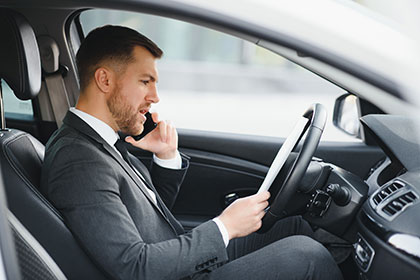
Always call the local police department to report a wreck, and then try to take as many pictures as you can of the entire crash scene. If medical professionals are at the scene, take advantage of any first aid screening and be sure to seek medical attention to ensure your own health.
If a person is driving a company vehicle or was driving while they were on the clock, an employer is not automatically liable for damages in these cases. Many crashes end up being the fault of other drivers or even third parties.
When people believe that they can have possible injury claims stemming from accidents while they are working, it is important to seek the help of an experienced car accident lawyer.
When you have legal representation, you can determine whether employers are responsible for their employees’ car accidents and how to proceed with your claim to recover everything to which you are entitled.
Factors That Determine Employer Liability for Employees’ Car Accidents
There are generally three types of situations in which employers can be liable for their employees’ car accidents.
Employer Negligence
It is never out of the question that an employer themselves can actually be the party that was responsible for an accident occurring, such as is the case when an employer negligently hires an unqualified driver or does not adequately supervise an employee. All businesses have an obligation to ensure that they are only hiring the most qualified employees who will not create danger for the public.
A good example of this kind of issue will be an employer hiring a driver despite the applicant having a history of driving under the influence (DUI) arrests. In such cases, employers can be liable for damages if the same driver causes an accident as the result of a DUI offense.
Employer obligations also extend to just ensuring a person has a valid driver’s license and automobile insurance in addition to a driving record that does not have any recent major violations. Employers should also consider utilizing drug or alcohol testing of employees who drive.
There may be other instances of employers violating strict state or federal regulations relating to drivers. For example, federal hours of service (HOS) regulations relate to the maximum amount of time drivers are allowed to be on duty, including their driving time and rest periods.
Respondeat Superior
Also known as the master-servant rule, respondeat superior is the legal doctrine that holds certain parties can be liable for the acts of their agents, meaning employers are liable for employees. A respondeat superior claim will generally need to prove that an act was committed within the limits of an agency or employer, an offense was incidental to the agent or employee’s responsibilities, and the agent or employee was motivated to benefit the agency or employer.
Federal courts have differing interpretations of respondeat superior, with the United States Court of Appeals for the Fifth Circuit and the United States Court of Appeals for the Eleventh Circuit both applying it, but the United States Court of Appeals for the Second Circuit, United States Court of Appeals for the Seventh Circuit, and United States Court of Appeals for the Ninth Circuit instead applying the concept of collective knowledge while United States Court of Appeals for the Sixth Circuit applies neither. In Ashcroft v. Iqbal, 556 U.S. 662 (2009), the United States Supreme Court held that plaintiffs must present a “plausible” cause of action and senior government officials can not be held liable for the unconstitutional conduct of their subordinates under a theory of respondeat superior.
A respondeat superior claim is usually going to be limited to employee actions that occur within the scope of an employee’s employment. An employee must have been performing some function of their work duties for a person to hold an employer liable.
Vicarious Liability
Respondeat superior is essentially a doctrine of vicarious liability for the acts of agents. Vicarious liability refers to cases in which an agency or employer is responsible for the actions of their agent or employee or another third party that has the ability to control the actions of an agent or employee.
Knowledge is not a required element of vicarious liability, meaning an employer can become liable for actions of which they had no knowledge. For example, an employer can be liable for an accident in which their employee runs a stop sign even though they were unaware of the violation.
An employer can be liable for damages when an agent or employee’s actions were within their duties as an agent or employee, an accident occurs while the agent or employee is working for the agency or employer, an agent or employee was performing a task they were supposed to perform for the agency or employer, and the agency or employer stood to benefit from the agent of employee’s actions. Employers will not be liable when such situations do not apply to their cases.
Determining the Scope of Employment
When accidents occur in the course of a person’s employment, the period is referred to as being the scope and course of employment. Agencies or employers will be subject to liability for third parties harmed by agents or employees when agents or employees were acting within the scope of their employment.
If only an employee is sued, the employee can seek indemnification from an employer when their conduct was within the course and scope of their employment. If only an employer is sued, the employer may try to avoid liability by claiming the employee’s conduct was outside of the scope of their authority.
Additional Liability Concerns
Taylor v. Roseville Toyota, Inc., 138 Cal.App.4th 994, 42 Cal. Rptr. 3d 68 (Cal. Ct. App. 2006) was a California Third District Court of Appeal decision in which a driver and passenger in a motor vehicle filed an action against an employee of Roseville Toyota who was driving a car owned by Roseville Toyota on a personal errand on his lunch break when he rear-ended a car stopped at a stoplight. Roseville Toyota was found liable for $277,662 in damages but appealed the judgment.
Much of the case focused on Roseville Toyota and permissive use under California Vehicle § 17150. The Court of Appeal concluded that Roseville Toyota gave permission to the employee to use the vehicle at the time of the accident.
The so-called coming and going rules dictate that employers will generally not be liable for car accidents that occur while employees are driving during non-working hours, such as when they are coming to or going from work. There can still be certain exceptions in these cases that can allow for employer liability in limited exceptions.
Employers may be liable for travel that is described as being “incidental” to a person’s job duties, including when employees must travel to or from company events. When employers require employees to use personal vehicles for work, pay employees for commuting time, or employees travel as part of their duties using a personal vehicle, employers can be liable for accidents that happen in these vehicles.
People also need to understand how special risks can apply in their cases, as one case involved an employee who suffered a work-related injury and was then involved in a motor vehicle accident on the way home. The employer was ultimately found liable for the accident because they should have had concerns about the employee’s ability to drive safely following the accident.
Employers who are concerned about the potential liability for their employees’ car accidents should consider reviewing their company policies and internal controls relating to motor vehicles. An employer will want to be sure that they have rules in place that prohibit employees from using cell phones while driving, offer training on driving, are actively ensuring employees are properly licensed, have confidence all vehicles are properly insured, and are regularly reviewing the driving records of all employees.
When Employees Are Liable for Accidents
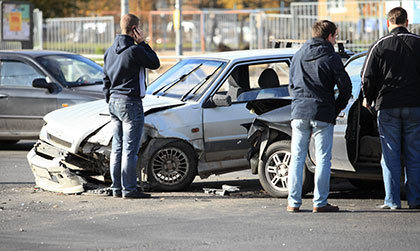
- Activities were not in the scope and course of employment – Any car accident in which an employee was not actively involved in performing assigned duties as part of their employment will mean the employee themselves is personally liable for all damages connected to the accident.
- There is willful misconduct – Employees will also be liable for their own instances of personal misconduct relating to their accidents, meaning an employer will not be liable for a collision that is the result of an employee knowingly or willfully violating a traffic law.
- Independent contractors are involved – One of the first distinctions employers will often seek to make following accidents involving company cars is when drivers are independent contractors. An independent contractor is not an employee, and an employer thus cannot be held liable for the actions of an independent contractor.
How Vicarious Liability Relates to the Actions of Employees
Many car accidents can involve complex claims for damages because it is often possible that a third party not involved in the actual crash is liable. For example, motor vehicle manufacturers can become liable for certain vehicle defects that cause collisions.
This page has discussed the theories of respondeat superior and vicarious liability, which mirror one another in many ways. Vicarious liability is a legal theory that allows people to hold employers liable for the actions of employees in some cases.
Employers can be liable for multiple situations in which their drivers cause motor vehicle accidents, and victims can be occupants of other automobiles, pedestrians, bicyclists, motorcyclists, or other parties.
Determining Whether a Driver Was ‘On the Job’
People cannot always assume a person was working, even when they were fully in uniform at the time of the collision. The general rule as it relates to most car accident claims is that people will be considered to have been working when they were actively performing duties associated with their jobs.
A person may be considered to be on the job when they are driving during work hours but are actually handling personal matters and driving their personal vehicle. People who run their own errands during work hours may not have work-related injury claims unless they happen to do anything that is work-related.
Driving to and from home is again not considered to be driving for work purposes. People can be driving for work in these situations when their jobs require them to make additional stops.
Employees vs. Independent Contractors
The modern economy has become known as the “gig economy,” with many people accepting temporary jobs delivering a wide variety of goods. Most of these same people are taking on jobs in which they will be classified as independent contractors.
The distinction of this title is important because independent contractors are not employees of the companies for which they are working. An accident with a DoorDash, Grubhub, or Uber Eats driver will not automatically make those companies liable for the accidents.
All of that said, there can be situations in which some major companies can be liable for certain accidents involving employer negligence.
The Verge reported that Amazon Logistics was a defendant in 119 vehicle injury lawsuits in 2021 alone.
Knowing When Employees Are Acting within the Scope and Course of Their Employment
When a driver is an actual employee of a company they are working for, then every action they take while driving will be considered to be within the scope and course of their employment. For example, a food delivery driver will be using their car to deliver food for their employer, and any accident that occurs while deliveries are being made will have occurred within the scope and course of employment.
If a food delivery driver is no longer working and goes to a local bar to drink alcohol before causing a drunk driving crash, the employer will not be liable because the alcohol consumption was not in the scope and course of employment. A driver will instead be personally liable for all damages, and people can file lawsuits against the driver.
Other Examples of Employer Negligence
Employers have many different obligations to several people they may not even interact with, as employers must properly hire the right employees, properly train their employees, and then entrust their employees to drive safely. When respondeat superior and vicarious liability do not apply, a simple negligence claim can still be applicable.
Employers can still be liable for negligence when they have duties to other parties, they breach their duty, the breach causes a person’s injuries, and the injuries result in damages.
Common Kinds of Employer Negligence
As mentioned above, the three most common kinds of employer negligence in motor vehicle accident cases generally relate to the following:
- Hiring employees – All employers need to be diligent in their hiring processes to ensure they are only hiring the best people for the job. When it concerns a driving position, an employer will certainly want to review a person’s driving record. Other criminal records can also be a reason for concern in some cases. Employers can become liable for failure to exercise proper oversight in the hiring process.
- Training employees – Not all employees will immediately know how to operate certain vehicles or the routes they should use, so employers must dedicate adequate resources to see that employees receive all of the training that will be required to be the best employees. Some accident victims can claim that inadequate training was a cause of the accident.
- Entrusting employees to drive – Employers can also face possible liability issues when they entrust people to drive who should not have received such authorization, such as when an employee has a history of motor vehicle accidents, does not know how to operate a vehicle, whose driving time violates federal HOS standards, or a vehicle was unsafe to operate.
How Workers’ Compensation Differs From Liability Insurance
People who suffer injuries while they are on the job can often experience confusion about what rights they have in these cases. While lawsuits and other legal actions in connection to an accident are one thing, the matter of workers’ compensation is another.
Workers’ compensation (also known as workers’ comp) is a system providing insurance coverage to employees who suffer injuries on the job. In most cases, workers’ comp will cover a person’s medical bills and also pay a portion of their lost wages.
People who suffer injuries while driving personal vehicles for work-related purposes can still be eligible for worker’s compensation. Always be sure to consult an experienced car accident attorney about your options.
Liability insurance is different in that this avenue relates to damages sustained by third parties in most cases. Third-party claims involve people who are not the subject of insurance agreements.
Many work-related car accidents involve an employer’s liability insurance coverage covering employees, so they are not personally liable for damages. Liability insurance can cover various damages, including medical bills, lost wages, and even pain and suffering.
A general liability policy will pay for damages from many different kinds of situations and accidents. Commercial vehicle policies will be automobile insurance policies for businesses that are similar to traditional insurance but often have far higher coverage limits.
People who are actively driving as part of their work but do not think their employers are providing adequate insurance coverage may want to take additional steps to help protect themselves. It is important for everybody to understand that a car insurance carrier can deny an accident claim when a person was using their motor vehicle for work purposes, about which they did not inform the insurer.
In these types of cases, people can benefit from an insurance endorsement known as a rider that will add, delete, exclude, or change insurance coverage. A rider can be an important provision for a person using a vehicle for business purposes that can result in increased insurance rates but also offers additional protection.
Always retain legal counsel for help dealing with an insurance company after a car accident because all insurers are operating under the same principles, which are to pay people as little as possible so claims can be resolved for the least amount. You will want to have a skilled work injury lawyer arguing why you deserve to be paid more than the insurance company will be initially willing to offer.
When Workers’ Compensation is Applicable
Employers will be obligated to pay workers’ compensation to injured employees who are hurt while they are driving for the employer. The workers’ compensation should provide for both medical expense coverage and part of a person’s lost wages.
Workers’ compensation gets paid regardless of fault, meaning employees are still covered even when they were at fault for their own accidents. The only time an employer will not have to pay workers’ compensation is when an employee’s injury claim has no connection to their work duties.
What People Should Do After Crashes in Company Vehicles
All motor vehicle accidents can be fraught and confusing experiences, but people need to try to remain calm and follow a couple of basic steps. Make sure you do all of the following if you are ever involved in a car accident involving a company vehicle:
- Call the police – Make no mistake, the police report relating to your accident will be a critical piece of evidence. For this reason, all people need to be sure that a law enforcement agency is contacted so a report can be completed as soon as possible.
- Focus on evidence – While you are at the scene of the crash, be sure you take as many photographs as you can of everything involved in the wreck. Also, be sure to exchange information with other drivers and look for any possible witnesses with whom you should also exchange contact information.
- Seek medical attention – Every person involved in a motor vehicle wreck will want to visit a hospital, even when they do not think they suffered an injury. Many injuries have delayed symptoms, and seeing a doctor days or weeks after a collision will only cause problems.
- Notify your insurer – People should be quick to report their collisions to their own insurance companies as soon as possible. The insurers will usually commence their own investigations. Do not contact another party’s insurance company without legal representation.
- Consider legal action – Make sure to find yourself a car accident attorney without delay so you can know what the next steps you should take will be. You may be filing a lawsuit, or your car accident lawyer can begin negotiating a settlement to your case.
Common Kinds of Damages for Which an Employer Can Be Liable
When employers are determined to be liable for motor vehicle accidents, then they can be subject to paying various kinds of damages. People may seek compensation for many different kinds of costs arising from a collision.
Some of the most common kinds of damages in these cases will include all property damage claims relating to a motor vehicle involved in an accident, as well as other property damage claims relating to items people had with them when accidents occurred. Other common types of damages relating to injuries in these cases may include:
- past and future medical bills
- past and future lost wages
- ambulance costs
- follow-up doctor visit costs
- rehabilitation
- medicinal needs
- pain and suffering
- emotional distress
- mental anguish
Damages in Commercial Auto Accident Cases
When work-related vehicles are involved in motor vehicle accidents, then victims can be entitled to various kinds of damages. Damages, in most cases, are considered compensatory, meaning they intend to restore people to their original conditions, and damages may be economic or non-economic.
Economic damages are the actual costs a person is dealing with following an accident, and they commonly include medical bills and lost wages. Non-economic damages are much more subjective because they have no inherent financial value and often include pain and suffering.
Additional damages in cases of wrongful death can involve awards for families who have lost loved ones.
How Coming and Going Rules Work
The phrase “coming and going” relates to people who are in the process of arriving at and leaving workplaces. In such situations, employers will not be liable for motor vehicle accidents connected to a person driving to or from work.
The distinction is important because a person who is involved in an accident with a company vehicle may have no claim against the employer if the vehicle was not being used for work purposes.
Understanding the Complexity of Employer Liability
Almost every employer in the nation must take out some form of workers’ compensation insurance, but some employers may also invest in employer’s liability insurance. An employer’s liability insurance policy will cover the costs of legal expenses relating to possible injury or negligence claims.
All insurance policies have specific limits that prevent them from paying more than that which a policy is limited. People will want to be sure that they have the assistance of a personal injury lawyer when trying to determine the ways they can hold employers liable should they be approaching policy limits.
Dealing with Insurance Companies
Virtually car accident cases will end up being negotiations between the insurance companies for the drivers involved. Insurers are always trying to minimize their own losses, so insurance companies will invest heavily in finding reasons to blame other drivers for most accidents.
Even when a business can be liable for a wreck, the company will typically have some sort of insurance company representing its interests. There can be insurance concerns when a negligent driver does not have automobile insurance or when the limits of their policy are not going to be high enough to cover the damages.
As it relates to possible employer liability, insurance companies will be prepared to argue why employers should not be liable and will likely find various reasons to support this argument. You will want to have legal representation so you can be confident that your arguments for damages can be heard.
Most insurance companies will be initially hesitant to settle cases, but settlements will become more likely as a trial date becomes more of a possibility. Insurance companies do not like to spend big bucks on the costs of going to trial, so they will usually settle most cases.
Frequently Asked Questions (FAQs) About Employers Paying for Car Accidents
Are employers responsible for their employees’ car accidents while driving company cars?
Yes, most companies will be liable for accidents involving company cars under the theory of respondeat superior. The employer can be liable for all damages stemming from the collision, even if an employee’s own actions or negligence were the cause of the accident.
Are employers responsible for their employees’ car accidents while driving private vehicles to perform work duties?
The answer will once again be yes, as employers are responsible for their employees’ car accidents while performing work duties even when they are using their own vehicles. Employer liability remains in place even when people are driving their own cars.
Are employers responsible for paying for injuries to other people involved in their employees’ car accidents, as well as drivers?
Absolutely. An employer will be liable for all injuries stemming from an accident, whether it is another driver, one of their passengers, a pedestrian, a bicyclist, a motorcyclist, or any other person.
Are employers responsible for paying for personal injuries to employees who were driving when accidents occurred?
The answer will typically be “yes,” provided that an employee was driving for work purposes at the time of the accident. This will be true regardless of the cause of the accident, even when a crash was the result of an employee’s own negligence.
Are employers responsible for paying for property damage as well?
You bet. Property damage is a very common kind of damage that most parties will claim because motor vehicle accidents often cause significant damage to the cars involved. Employers must pay for all property damage claims connected to their accidents.
What happens when substance abuse is involved with an employee’s poor judgment in connection to a car accident?
Anybody who is accused of driving under the influence of alcohol or drugs will want to be sure they retain the services of a criminal defense attorney. People can face possible criminal charges when they cause accidents after being intoxicated, and penalties in these cases can be quite steep. When a person is using a prescription or other lawful medication, they may have certain defenses against criminal charges. Even when a person is accused of having been under the influence of alcohol or drugs, there can be several errors with police testing that may invalidate test results.
What happens when an employee is speeding when an accident occurs? Will the employer still be responsible for the car accident?
In most cases, employers are responsible for their employees’ car accidents that stem from speeding violations. People should still be certain to speak to an experienced attorney about what options they have in these cases.
What happens when employees are mixing personal errands with business duties when they get into car accidents? Are employers still responsible for car accidents?
All employers who are facing accusations of potential liability will always be seeking ways to argue that employees were not performing work-related duties, so people should be aware that many employers will try to use an employee doing anything not work-related as being a reason to find the employer is not liable. When an employee was performing some personal errand at the time of a collision, then an employer will likely not be liable. If a person was performing several job-related duties, however, and a collision occurs while they are doing one non-work related function, the employer may still be liable. o, the answer to the question “Are Employers Responsible for Their Employees’ Car Accidents?” is not a simple yes or no. Liability depends on the specific circumstances of the accident and whether the employee was acting within the scope of their employment at the time of the collision.
Are employers liable for accident costs incurred during an employee’s commute? What if employees use company cars for their commutes?
Again, the time people spend driving to and from work does not count as being a work-related drive, meaning that people cannot hold employers responsible for their employees’ car accidents that occur on their drives to and from work, even when they are driving company vehicles.
The one exception to this rule will apply if an employer asks an employee to visit a destination for employment purposes specifically. In such cases, an employer can become liable.
Contact Our Experienced Car Accident Lawyers in California
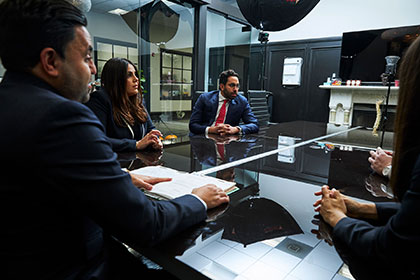
Our firm can immediately commence our own independent investigation into your crash, and we will work tirelessly to ensure that an employer pays all damages when it is clear that the employer is responsible for their employees’ car accidents. You can call (888) 488-1391 or contact us online to take advantage of a free consultation.

